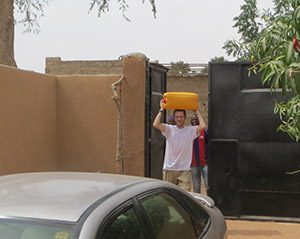 Carrying water from the local well is not something most people from the U.S. do. However, in Niger—where Michael Ludwig ’09 serves—it’s everyday life. Although many neighbors offer to assist with the task, Michael comments, “I've found I was actually doing it with a lot of pride, rather than mindfulness of my vulnerability. After reflecting on Jesus' example I can see I've been wasting an opportunity to minister out of my weakness because I am most excited to show the neighbors that we're not lazy foreigners even if we do have electricity and running water at our house. Sometimes."
Carrying water from the local well is not something most people from the U.S. do. However, in Niger—where Michael Ludwig ’09 serves—it’s everyday life. Although many neighbors offer to assist with the task, Michael comments, “I've found I was actually doing it with a lot of pride, rather than mindfulness of my vulnerability. After reflecting on Jesus' example I can see I've been wasting an opportunity to minister out of my weakness because I am most excited to show the neighbors that we're not lazy foreigners even if we do have electricity and running water at our house. Sometimes."
Michael and his wife, Rachel, are PCUSA mission co-workers serving in Niger, West Africa, with their two children. For the past two years, as they’ve lived and worked in this place where Christians are a one percent minority, they’ve come to see that in many situations they minister best out of being vulnerable and in their weakness.
This realization was quickly made apparent soon after they arrived. A young neighbor boy would come to their house and say in Hausa, “Sing.” The Ludwigs had already learned a few songs about Jesus in Hausa, so Michael thought “What a great opportunity to share with a kid who keeps asking to hear our songs!” A few months later they learned some Hausa swear words . . . and discovered that one of them sounds quite similar to the word for “sing.”
Most adults in Niger would have responded to this boy’s behavior by hitting him with a stick or swearing back at him. But the only thing they had to fall back on was a guess that they should sing songs about Jesus. In a humbling lesson to them, God used their weakness in Hausa as an opportunity for this boy to hear that he is loved and there is a Savior. Michael says, “And now we’ve become more like family to him, as he comes around a lot more since his father, in an effort to make ends meet, has left for Libya to try to get work or make it to Europe.”
Michael continues, “We don’t know what fruit these interactions may bear in the future, but I can’t imagine a better rooting for this relationship than in our family’s vulnerability in language. I have a feeling there will be many more misunderstandings between us, but I do hope that how we respond to him every day will reflect less on our own work ethic and more on Jesus’ love for him.”
May we all have eyes to see our vulnerabilities as opportunities to sing Christ’s praises.
